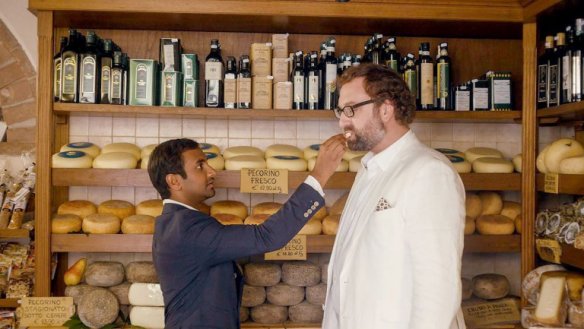
I always say “allora”, Dev’s (Aziz Ansari’s alter ego) favorite word in the second season of Masters of None. I use it in my English conversations each time I am about to explain something to someone. In my case, however, it is not really a favorite. Not something I am proud of. It is more an expression that my parents and teachers wanted me to avoid since first grade: “Giuseppe! Stop saying “allora” all the time!” Nonetheless, it’s still here with me. To the point that usually, after about twenty minutes in a first day of class, my students are forced to ask me what it means, for the many times I have already used it. I liked hearing Mr. Ansari pronouncing it in that funny way. And I watched with awe and joy the Italian episodes of Masters of None. The idea of selecting a non-famous touristic destination as the setting of Dev’s life in the Bel Paese; the incredible (sometimes even excessive) homage to Italian Cinema and Neorealism; and the portrait of a generation of young Italians as “citizens of the world”, with their almost impeccable English and an elegant, positive, sympathetic way of looking at life (think about how they laugh at Dev’s idea of “me time” in the first episodes). All these things pointed towards a seemingly positive effort that Mr. Ansari’s was making in going beyond a stereotypical image of Italy. But does he really do that in the end?
At the beginning, I was falling for it. But then I just needed to see him back in New York City to realize that, no matter how beautiful and intensely unique his representation of Italy and Italians was, it still left me with a bitter taste, the feeling of a lost occasion. Because what Ansari can do so masterfully in his show (describing New York City’s complexity of characters, reflecting poetically on life in the Tinder Age, fighting the “whitewashing” of American mainstream culture, and offering the perspective of immigrant families to the rest of the world, among many other things) is completely lost in his representation of Italy.
I say this because once I decided to peek beyond the cinematographic references, the pasta eating and making, the wonderful piazzas, the hills of Tuscany and the comical sketches in narrow alleys, I saw a blank page. And now, after a couple of days of watching the show (I am only at episode 5), I really wish that somebody had filled that page with something else. With what, you might ask. Well, with the complexity of characters, and the many layers of life in Italy; with the many immigrants that live everywhere in Italy and whose voice is always silenced; with Italians who not only like sauce and export tiles or wine, but publish great literature (beyond Elena Ferrante), produce incredible electronica (Populous and Clap! Clap!), and still make great cinema (beyond Neorealism and Paolo Sorrentino). Even Bottura’s Osteria Francescana, the perfect symbol of an Italy that transcends tradition, climbing new peaks of creativity and innovation, is not properly “narrated”, as, I believe, it just comes out as any other Italian restaurant in the show. At a closer look, aside from Francesca, no other Italian character is developed, and in other situations that could have totally felt like some form of cultural appropriation and silencing.
One of the problems of contemporary Italy is that in a globalized world, somebody (too many!) decided to make a postcard out of it. And this has been happening for about fifty years or more. Italians conveniently enjoyed the comfort of that postcard and now struggle (as they always did) in finding an identity that goes beyond a list of stereotypes that have been always used to describe them.
Mr. Ansari seems to have the intention of ripping the postcard apart, but surprisingly designs a new one, leaving me, an Italian who spent most of his life trying to escape those postcards, trapped in them again. Let me make this clear: I don’t think Aziz Ansari is at fault of anything. I don’t think it was his job or his responsibility to save Italy from its stereotypes. Ultimately, I think that Master of None is a masterpiece that we should all look at as a model that is part of a new tradition of American film making (we can include Louis C.K. and Lena Dunham in this tradition) that is and is going to be influential for a long period of time.
No. I am not accusing Mr. Ansari of anything, and, to be completely honest, I don’t really know who to blame. Maybe I am mad at the “disneyzation” of the world (from which no one is immune), or maybe, again, we Italians enjoy being put in a postcard. Or there is a major effort that we Italians need to make to forget our traditions or look at them from thousands of miles away, in order to reinvent ourselves and our country. I just know that, to escape this other postcard, I had to go back to Nanni Moretti’s 1980s movies, like Bianca (I wonder if Ansari and Dunham ever watched them, given the striking similarities) or to that scene in Io sono un autarchico when Moretti vomits green blob as he learns that Lina Wertmuller is seen as a true representative of Italian cinema in the US (here is the video). And I’ll always walk around the world with Massimo Troisi in my heart, who, in Ricomincio da Tre, constantly had to re-assert his status of a Neapolitan who did not consider himself an immigrant, and had to convince the world around him that yes, he was Neapolitan, but he did not really need to migrate, it’s just that he really wanted to see the world. Again, trying to escape a stereotype that had been imposed on him.
